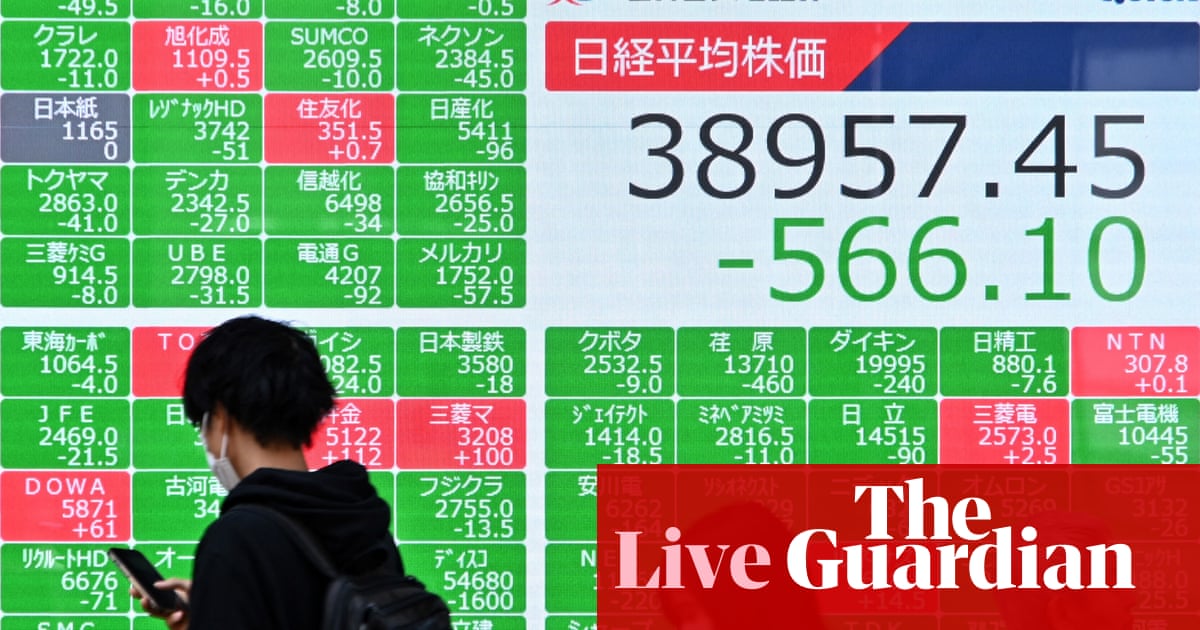Key events
Brent crude oil has dropped by 0.5% this morning, to $90 per barrel, a subdued reation which suggests markets believe the fallout from Iran’s strike on Israel will be contained.
Oil has risen this year, up from $75/barrel at the start of January, indicating that a geopolitical price premium had already been built into the cost of energy.
Bartosz Sawicki, market analyst at Conotoxia fintech, predicts that the geopolitical risk premium is set to remain elevated, adding:
Israel’s government’s potential response is still extremely uncertain. The stakes are high. Significant retaliation could lead to a wider conflict, consequently triggering a rally in oil prices, robust demand for the US dollar, and renewed buying of gold.
Iran produces almost 3.5m barrels of oil per day, or 3.3% of world production, so any hypothetical loss of those supplies (perhaps though sanctions) could leave the world undersupplied.
Across the markets, there were limited losses in Australia overnight, where the ASX 200 share index has fallen 0.5%.
South Korea’s KOSPI 200 has also dropped 0.5%, while India’s SENSEX has lost 0.75% – relatively mild falls.
Aussie shares fell for a third straight session on Monday as the #ASX200 closed 36pts or 0.5% lower to 7,752. Eight of 11 sectors were in the red with tech (-1.8%) weighing most. Energy (+0.4%) fared best while materials also rose.
— CommSec (@CommSec) April 15, 2024
Kyle Rodda, senior financial market analyst at Capital.com, explains:
Asian cash equities have dropped to reflect the heightened risk of war in the Middle East. However, the move wasn’t as deep as what was reflected in futures prices from Friday’s close.
A lift in US futures today indicated relief that the attack wasn’t worse and is yet to provoke retaliation and significant escalation. The markets await Israel’s response to assess the risk of a broader conflagration and deepening conflict.
Introduction: Markets nervy amid fears of Middle East escalation
Good morning, and welcome to our rolling coverage of business, the financial markets and the world economy.
The financial markets are in a nervous mood this morning, as investors fear escalating tensions in the Middle East after Iran’s military strike on Israel last weekend.
Many Asia-Pacific stock markets have fallen into the red, with Japan’s Nikkei losing almost 1% today, amid fears that open warfare could erupt in the region.
But there’s also relief that Iran’s first ever direct attack on the Israeli state did not cause more damage, with almost all the drones and missiles intercepted, leading to hopes that further retaliation and escalation could yet be avoided.
The oil price, a bellwether for Middle East tensions, has dropped slightly this morning. Brent crude is trading around $90 per barrel – away from last Friday’s six-month high of $92/barrel.
Risk appetite is better this Monday morning than it was last Friday when the world was bracing for Iran’s retaliation on Israel, reports Ipek Ozkardeskaya, senior analyst at Swissquote Bank.
Iran fired more than 300 drones and missiles on Israel on Saturday night, but only a small number reached Israel, limiting damages. There were no fatalities, just an army base was slightly damaged.
Good news is Tehran called the operation a success and declared that it won’t take further actions unless Israel responds.
Israel signalled last night that it would not immediately act alone, but also says its forces remain on high alert:
Reports that President Joe Biden has told Israel’s prime minister Benjamin Netanyahu that the US wouldn’t support any Israeli counterattack against Iran suggest there is more caution about an escalation.
This uncertain backdrop means that markets haven’t sold off further this morning relative to Friday, explains Deutsche Bank strategist Jim Reid, who told clients this morning:
Since last Friday, geopolitics has returned as the biggest concern for markets, as investors react to Iran’s attack on Israel over the weekend.
But since markets have reopened after the weekend, the reaction among key assets has been subdued, with investors hopeful that any escalation will prove contained.
The agenda
-
10am BST: Eurozone industrial production for February
-
12.15pm BST: BoE deputy governor Sarah Breeden gives keynote speech at the Innovate Finance Global Summit 2024 “The outlook for payments innovation”.
-
1.30pm BST: US retail sale for March
-
3pm BST: NAHB’s US housing Market Index







